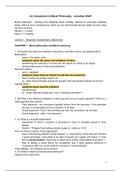Summary
SUMMARY AND READING QUESTIONS : An Introduction to Moral Philosophy - Jonathan Wolff
- Module
- Institution
- Book
This document contains the extensive answers (discussed in class) of the reading questions of the book "An Introduction to Moral Philosophy" from Jonathan Wolff, as well as a summary of the chapters, starting from the fourth one (the previous ones being quite short). It also provides a summary of a...
[Show more]





